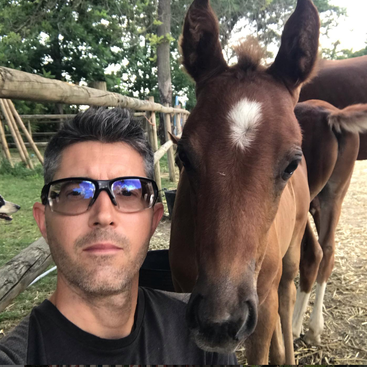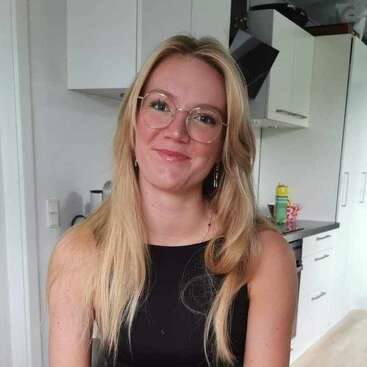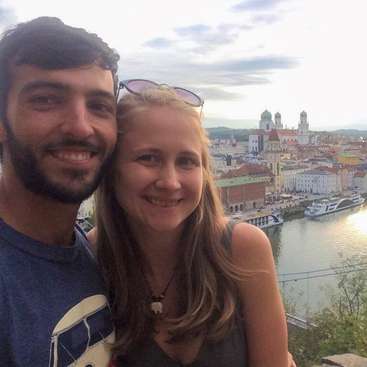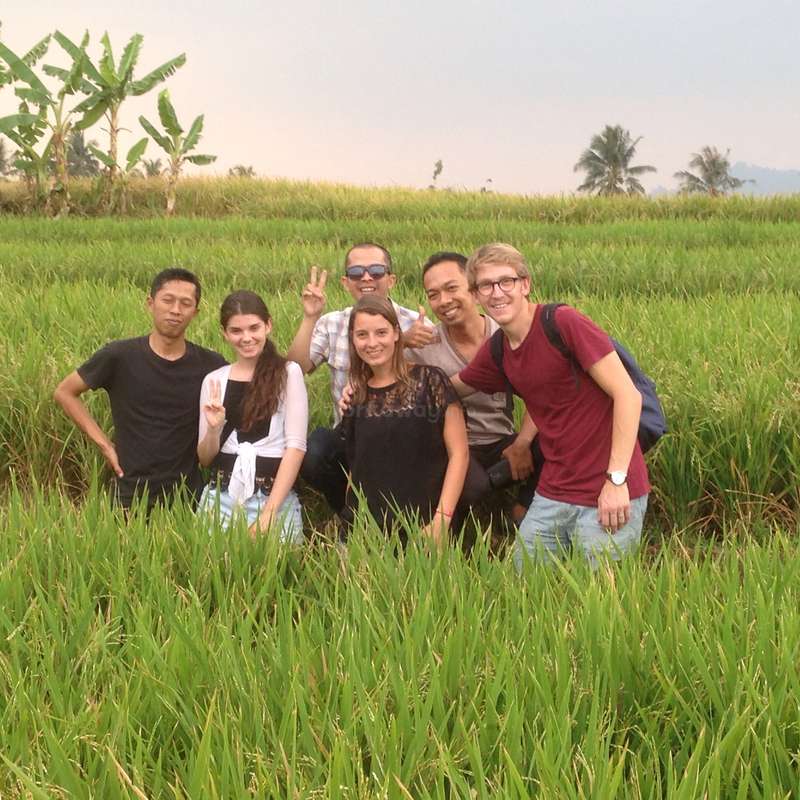Profile information

Host rating
100 %

Last replied
20 Jan 2026

Reply rate
100.0 %
Usually responds within 7 days

Feedback
108

Email verified
Country info
Badges (3)




Find your perfect host
Details

Description
Hello Volunteers,
We have begun hosting English speakers again! As you may be aware, we were forced to temporarily stop our operations during the pandemic. Fortunately as of November 2023, are reopening as it become safe.
If you would like to volunteer and help the local students with English, you should be aware of some small changes regarding appropriate Visa(s.) Visa On Arrival or VOA, is no longer valid for volunteering in Indonesia. You need a specific VISA. This change applies all over Indonesia. So, 1-2 months before coming to Indonesia, please contact the local host for further information and to begin organising the specific visa. It is not too difficult or expensive, we just prefer to do things the proper way to avoid any complications. I look forward to any inquires.
Volunteering is a chance to sleep in a local, Indonesian-style house, sample fresh, home-cooked fare and socialize with a group of inquisitive and friendly young Indonesians. Cianjur-West Java is a small town located in between two big cities, Jakarta as a capital city and Bandung as a province capital city. I and my friends, mostly English teachers would like to invite any volunteers to motivate and improve our student's English ability, because Cianjur town is off the beaten track, there is hardly any tourist around anywhere you go.
Types of help and learning opportunities
Language practice
Teaching
Hospitality/Tourism

Cultural exchange and learning opportunities
Volunteers can get a free accommodation with a private room, and meals (breakfast, lunch and dinner). They can also get a sightseeing tour in surrounding area. They can also learn Bahasa Indonesia if they want.

Projects involving children
This project could involve children. For more information see our guidelines and tips here.

Help
Our programme was created in 2010 by a small group of English teachers who have been working for several years alongside Native Speakers. The reason that we created this programme is to help the local students and give them the opportunity to learn English with English speaking-people. Cianjur is a non-touristy place with few travellers, so meeting english-speaking people is particularly valued here.
In 2013, our programme was recommended by The Lonely Planet Guide Book. The programme was founded by five locals; the team are enthusiastic and passionate about improving the local student’s English.
The team:
Irwan Kumis, who is fluent in English, has been teaching primary school English for 15 years, as well as working for several years as a guide for Western travellers. He previously worked for a German NGO, Forder-und Interessengemeinschaft, as a volunteer in post-Tsunami Reconstruction and Development on Sabang–Weh Island–Aceh. He studied Economics at a University in Cianjur and then some years later, realising his love for teaching, studied English Education. Much of his free time is spent working and socializing with different people from around the world.
Ade Setiawan, graduated in economics from university last year in Cianjur. He has an American nick name "Jhon". He is a neighbour of the homestay and he is a cool man. He has plenty of time to guide and look after the volunteers. He did an Indonesian backpacking cross to Bali by hitchhiking.
Syifa Nurul, is an English in a high school. She has been teaching English since 2011. Her English is wonderful and she is a nice lady.
Haseum, is a web designer who builds this website. Now, he is an internet business consultant in Jakarta.
The programme centres around volunteer teaching primarily in local Primary and Secondary Schools but also in university and the prison where native speakers can help students and teachers with their English. Although native speakers are preferred, it is also great for non-natives who speak English to join the programme. Students are excited to meet English speakers from all over the world. If you are an English teacher, you can teach with your own method in which you feel comfortable, however we also have lesson plans.
Our main part of the programme is to help the local students with English because it is the best way to get to know the culture and socialize with the local people, but our programme is flexible. Travellers can choose what they’d like to do, whether it’s visiting countryside, the floating village, botanical gardens, tea plantation, traditional market, ricefields, waterfalls, hotspring, go hiking to the volcano, cycling or even doing Yoga. Travellers might of course be too busy socialising with new friends or fellow teachers they’ve met in Cianjur to do all of these!
The homestay is located in an indonesian neighbourhood where travellers can get an insight into the everyday life in Cianjur. We try our best to immerse our guests in the local culture and environment, so this is a perfect programme for those interested in learning more about Indonesian culture, cuisine or the Bahasa Indonesia.
Recently, we are setting up an English School. It is an afterschool program where students can go and learn English there.
Things to do
Teaching Volunteer
Volunteering is about giving but it is also about the experience of sharing time with like-minded people, sharing the languages and sharing the fun. Today's volunteers are part of a wonderful history of selfless giving in the face of need. Their effort has helped people to find new hope against poverty for a better future. Without volunteer English teachers, most children would not have the chance to speak to a native English speaker.
Indonesian English teachers work hard to make their students proficient, but we can add greatly to their effectiveness with regular classes and intensive visits to schools. If the children can master English, their futures are far more promising in this fast-changing country.
English is one of the most useful languages to speak in the world, but it is often difficult for Indonesian students to master the language without having the chance to practice with English speakers. Schools in Indonesia teach English from Primary level (8-11 years) until Secondary level (12-18 years) and volunteer English teachers are always in high demand. Expect teachers to give you a genuinely warm welcome into their schools, often inviting guests to have lunch with them and expect the children to be very excited that they have an english-speaker in their school.
Volunteering positions are great for people of all ages, from recent college graduates to retirees seeking meaningful opportunities to use their knowledge and experience.
We have opportunities for guests to help out in local schools, running conversation classes with students or teaching English using their own methods. Each school is different; some have relaxed learning environments, others are more formal classroom setups. The classes range from around ages 6 to 20. With younger classes the emphasis is on very basic questions and answers, allowing the students a chance to practice their English with a native speaker or English speaking person. Expect the majority of classes to consist of gentle children who have a wonderful sense of humour but are also very shy. It is important for younger students to practise speaking throughout the class and a volunteer can really help with pronunciation and boosting confidence.
With older groups you are free to take initiative or follow a similar question and answer structure - either in one-on-one 'interviews' or by stimulating class discussions. Older students might be particularly nervous about making mistakes so boosting confidence in a friendly environment is key. Older students are often more interested in your background but sometimes they have difficulty translating their questions into English. However, there is always an English speaking teacher on hand to help with translations if necessary. To help prepare for your classes, writing a list of age-appropriate questions at various levels would be extremely useful. Having a few word-based games (hangman, memory games, tic tac toe, etc) are also great as an icebreaker to relax students or to fill up time at the end of the session.
We offer volunteer teaching placements in several local schools, universities and even at a Prison. Volunteer teaching in Cianjur, Indonesia will leave you feeling fulfilled in the knowledge that you’re making a tremendous impact on the future lives of underprivileged children. We are also happy to pass on donations to schools or students on behalf of volunteers.
While the majority of teaching takes the form of one time visits to local schools. We are currently in the process of setting up an English School. It’s an afterschool programme that students can attend after their day at the public school to develop their english skillls. Most of the students have a high motivation to learn English because the language expands their options for the future.
If the volunteers stay for longer than one week, they are able to teach the same groups of students multiple times, giving the classes a sense of continuity and allowing the students and volunteer teacher to develop a relationship beyond that of the usual one-time visits.
This can be an exceptionally rewarding experience as the volunteers see their students develop their language abilities and grow in confidence. There may also be an opportunity for volunteers to accompany students from a local school on a fieldtrip. Destinations include Bandung to visit Tangkuban Perahu and Kawah Putih Volcanoes, Yogyakarta to visit Borobudur and Prambanan Temples, Pangandaran beach, etc. These are excellent opportunities to spend time with the students outside the classroom while seeing the attractions Java is famed for.
Cianjur Town
Cianjur is a Sundanese land in West Java. Many Indonesian people say that Cianjur people are most friendly people in Indonesia. Cianjur is a thriving town with a population of around 200,000 people, situated at the foot of Gede Pangrango volcanoes in West Java. Cianjur is easily accessible to tourist destinations in Java and other surrounding islands. Although a key transit point between the major cities of Bandung and Jakarta, Cianjur still remains largely unvisited by tourists. It's a land of enchanting natural beauty, blessed with cool mountain air. Cianjur holds several places of interest for visitors, including Volunteer Teaching, Cibodas Botanical Garden, Puncak Pass Area, Tea Plantation, Nusantara Flowers Garden, The Floating Village, Visiting the Villages, Mount Gede Pangrango, Archeological Site and Indonesian Martial Art/Pencak Silat.
Cianjur is famed as a major rice-growing region, particularly for its popular Pandanwangi rice which only grows in Cianjur. Other regional specialties include Maranggi (barbequed beef), Lontong (sticky rice with tofu, crackers, fried onion and coconut milk soup), Batagor (flour and tofu fried with peanut butter sauce and lime), Lotek (steamed vegetable with peanut butter sauce, onion, crackers, chili), Karedok (raw vegetable with peanut butter sauce, onion, crackers, chili), Geco (bean sprout, fresh local noodle, rice covered with coconut leaves, crackers, onion and soy bean sauce), Rice Porridge (chicken, crackers, onion, spring onion, peanut, and chili sauce), Pickled Fruits and Tauco (soy bean sauce).
Hiking to the Volcanoes and Hot Spring
West Java has some volcanoes to visit. One of the most spectacular volcano in West Java is Tangkuban Perahu. Tangkuban Perahu (spelt Tangkuban Parahu in the local Sundanese dialect) is a dormant volcano 30 km north of the city of Bandung, the provincial capital of West Java, Indonesia. It last erupted in 1826, 1829, 1842, 1846, 1896, 1910, 1926, 1929, 1952, 1957, 1961, 1965, 1967, 1969, 1983.
It is a popular tourist attraction where tourists can hike or ride to the edge of the crater to view the hot water springs and boiling mud up close, and buy eggs cooked on the hot surface. The Tangkuban Perahu volcano is famous for its legend.
The name translates roughly to "upturning of (a) boat" or "upturned boat" in Sundanese, referring to the local legend of its creation. The story tells of "Dayang Sumbi", a beauty who lived in West Java. She cast away her son "Sangkuriang" for disobedience, and in her sadness was granted the power of eternal youth by the gods.
After many years in exile, Sangkuriang decided to return to his home, long after the two had forgotten and failed to recognize each other. Sangkuriang fell in love with Dayang Sumbi and planned to marry her, only for Dayang Sumbi to recognize his birthmark just as he was about to go hunting.
In order to prevent the marriage from taking place, Dayang Sumbi asked Sangkuriang to build a dam on the river Citarum and to build a large boat to cross the river, both before the sunrise. Sangkuriang meditated and summoned mythical ogre-like creatures -buto ijo or green giant(s)- to do his bidding.
Dayang Sumbi saw that the tasks were almost completed and called on her workers to spread red silk cloths east of the city, to give the impression of impending sunrise. Sangkuriang was fooled, and upon believing that he had failed, kicked the dam and the unfinished boat, resulting in severe flooding and the creation of Tangkuban Perahu from the hull of the boat.
Ciater Hot Spring
After visiting the volcano, swimming in the hot spring is the best option. There is a nice hot spring swimming pool just a few KM north east of Tangkuban Perahu. It is a hot spring set in gorgeous grounds on the lower slopes on the volcano. There are three large pools, a spa and restaurant. And It is very quiet in the week. The hot spring is an attractive village surrounded by tea plantation.
Visiting the Rural Village
Agriculture is Cianjur's primary business and the vast terrains of terraced rice plantations are always teeming with workers, planting, harvesting the crops or ploughing the land using water-buffalo tractors. Our guests have the opportunity to visit the rice fields and learn about the process – you can even join them for a few hours work in the fields if you want! A walk through the slippery rice plantations offers unbeatable views and a real glimpse into traditional rural lifestyles. Eat in a local home and watch your lunch being cooked on traditional fire-wood stoves.
The Floating Village
The floating village is set at a huge artificial lake at Bobojong Village, around 15 km North of Cianjur, which is used to generate power as well as for household water supplies.
The village itself is a series of floating bamboo huts and is the biggest fish farming community in Indonesia. There are thousands of fish farms in the floating village and at least there is one fish care taker who takes care the fish. There is no electricity, entertainment and friends. Travellers can take a boat out to visit the villages, feed the fish and marvel at the wide variety–Gold fish, Catfish, Coyfish, Alligator fish, Nila fish, Gurame fish... the list is endless!
Tea Plantation
Most Indonesian tea plantations are owned by the Government and there are three big tea plantations in Cianjur: Gedeh Tea plantation; Pasir Sarongge Tea Plantation and Sukanagara Tea Plantation. Gedeh tea plantation grows black tea and is located about 10 KM Southwest of Cianjur, at the foot of the Gede–Pangrango National Park.
Pasir Sarongge is a green tea plantation, located about 10 KM West of Cianjur and makes a great day trip for travellers. You can watch the tea-pickers at work and have a go at picking the tea yourself, then explore the factory where it is processed and even try a cup for yourself! A stroll through the beautiful tea plantations offers great views of Cianjur.
Archaelogical Site
Gunung Padang Archaeological site is one of Indonesian heritage. It is located at Gunung Padang and Panggulan area, Campaka–Cianjur, 25 km South of Cianjur. Now, this Archaeological site is well-taken care by the local government. The government will do an excavation under the mountain.
The biggest megalithic in South East Asia, it is a difficult route to get there, climbing up stairs to visit the holy area covered in massive volcanic stones, but travellers will pass through the tea plantation and the villages. The scenery is so awesome. But not many people know this Archaeological site.
Thankfully, we have connections with locals who can guide travellers who wish to see the top, and stay in nearby homestays. Many local people go to the Archaeological site for picnic.
Yoga Class
Yoga is a practical aid, not a religion. Yoga is an ancient art based on a harmonizing system of development for the body, mind, and spirit. The continued practice of yoga will lead you to a sense of peace and well-being, and also a feeling of being at one with their environment.
The practice of yoga makes the body strong and flexible, it also improves the functioning of the respiratory, circulatory, digestive, and hormonal systems. Yoga brings about emotional stability and clarity of mind.
Cianjur is the best place for Yoga, because Cianjur has a Yoga course taught by an experienced instructor who has learnt Yoga in India for a while. She wants to share her useful knowledge with the local people.
Cooking Lesson
As well as spending time helping the local children with English, it is possible to learn more about the local food specialities in Cianjur, watch and help prepare them, and more importantly, eat them!
You can watch and assist the local food stall holders whip up a fresh dish of nasi goreng on the street, or watch them preparing the food to sell before they are at their stall. Kumis' mother cooks at home and so it is possible to help her cook your own dinner, as well as help other people cook too. All these experiences are more authentic than a cookery class, as it shows you how and what the locals cook. You also get to eat the food too! There are a lot of local specialities such as beef sate, nasi liwet, and lontong, which can be eaten in great little warungs as well.
Live Music on Weekend
Travellers can hang out and mingle with the local people in the local cafes. This is the most favorite place for young people in Cianjur to hang out, especially on weekends.
Travellers can enjoy being there and drink a local Beer “Bintang or Anker” and conversation with local English teachers, students and musicians – everyone is excited to get to know our guests and will have lots of questions for you! Every Saturday and Sunday evening, travellers can listen a live music performed in town.
Getting Here and Away
Cianjur has many transportation options and is easily reached from Jakarta's Kampung Rambutan bus terminal. There are many half-hourly buses that go to Cianjur via Puncak Pass, a 3 hour journey (50.00 rupiahs air-con bus).
From Jakarta International Airport, take a DAMRI shuttle bus to Bogor for 130.000 rupiahs, then a minivan to Cianjur (around 2 hours, 40.000-50.000 rupiahs). Or From jakarta International Airport, take a DAMRI shuttle to Kampung Rambutan bus terminal for 100.000 rupiahs, then a Marita bus to Cianjur for 50.000 rupiahs.
From Bandung Airport, take a taxi to Bandung Leuwi Panjang bus terminal, or from Bandung Train Station, take a taxi or a DAMRI city bus to Leuwi Panjang bus terminal.
From Bandung Leuwi Panjang bus terminal, there are also many half-hourly buses that head to Cianjur and take2 hours (30.000 rupiahs economy/40.000 rupiahs air-con bus).
From Pangandaran, there is a direct bus to Cianjur for 150.000 rupiahs (7 hours), otherwise take hourly BUDIMAN Bus to Bandung (around 5-6 hours, 80.000-100.000 rupiahs) and connect via local bus to Cianjur.
From Yogyakarta or Solo, there are several night buses that go direct to Cianjur, leaving from Yogyakarta's Giwangan bus terminal or Solo bus terminal in the afternoon (3-5 PM), otherwise take a train to Bandung from Yogyakarta's Tugu Train Station or Solo's Balapan Train Station and connect via local bus to Cianjur.
Languages
Languages spoken
English: Fluent
Indonesian: FluentThis host offers a language exchange
This host has indicated that they are interested in sharing their own language or learning a new language.
You can contact them directly for more information.
Accommodation
Accommodation/Homestay
Guests will stay with a local family, who lives in their family home in a kampung (small neighborhood of houses piled atop each other navigated by narrow alleyways) in the heart of Cianjur. Living with local families is an excellent experience that exposes guests to the real everyday life in Indonesia as they interact with the other residents (including the many children!) of the kampung, engage in the everyday activities of an Indonesian family, and even have the opportunity to learn a bit of Bahasa Indonesia and the West Javanese language of Sundanese. Guests are also able to accompany his mother to the local traditional market and to learn how to prepare Indonesian dishes.
The local family provides accommodation in a private room, meals (breakfast, lunch and dinner). And you can also have dinner out, because there are so many Indonesian cheap food nearby. Needless to say, the homestay alone is worth the experience!
What else ...
After doing a volunteer project a few hours in a day, normally we usually take our guest to the tourist attraction, such as to the tea plantation, hotspring, botanical garden, climbing volcano, etc.

A little more information

Internet access

Limited internet access

We have pets

We are smokers

Can host families

How many Workawayers can stay?
Two

My animals / pets
Chat with Workawayers who've visited this host






Feedback (76)
Chat with Workawayers who've visited this host






Feedback
These are extra optional ratings when members leave feedback. The average rating left for each option is displayed.
Accuracy of profile:
(4.9)
Cultural exchange:
(5.0)
Communication:
(4.9)
Thank you for joining our Volunteer programme. They joined our program for more than two weeks. In the first day I picked them up in Bogor, I was so impressed with their characters and personality. They are a great couple. They are brilliant and patient to teach English with the students. They are hard workers and always want to… read more
Kumis classes were very well structured and the students were always eager to develop their English skills. We also taught english at various… read more
Thank you for joining us. Cait joined our program for a week. What made us so impressed is that she flew straight from Aussie to Indonesia just to join our program for a week, then flying back to Australia. That’s why we tight our schedule for her, because she wanted to do many things with short time. Anyway she is a smart, cool, young… read more
Thank you for joining us here in Cianjur-West Java, Indonesia. Shawna joined our program for about two weeks. We dont know what to say about her. She is one of the best our volunteer. She is a smart, cool, enthusiastic and easy going woman. She always had something to encourage the students spoke up, so the students really enjoyed… read more
Thank you for joining our Volunteer in the Program in Cianjur-West Java, Indonesia. She joined our program for one month. I could not say anything about her. I was speechless about her, because She is GREAT. I have to say that she is one of our best volunteer. She is also a reliable and fantastic volunteer. She knew what to do when… read more
Thank you for joining our Volunteer program in Cianjur-West Java, Indonesia. She joined our program for two weeks. She is a great volunteer. She taught how to speak English properly and as an American girl with a wonderful accent made the students easily to learn English with her. The students had a fantastic day with her, especially… read more
Kumis is a wonderful host and person :) funny, organized, and understanding (and his girls are oh so charming). The work he's done… read more
Thank you for joining our Program in Cianjur-West Java, Indonesia. After a long periode, finally We had someone from Russia and We really liked hosting her. We loved to learn about her country and culture. Kate joined our program for more than two weeks. She is an easy going and hard worker girl. She taught and shared English with our… read more
I had a very interesting and special experience with Kumis and the K-Team! Every day was full of events, I tried all kinds of local food, met a great number of people and trained my skills in working with a big audience (of kids :)
So it's a nice opportunity to not only experience another culture from the inside, but to learn… read more
Thanks for joining our teaching volunteer program in Cianjur-West Java, Indonesia. She joined the program in Cianjur West Java for two weeks. She came to Cianjur when we just started our new International Language Center. At the beginning, we only had 30 or 40 students, but with her efforts and promotion activities, we could get more… read more
Unfortunatley I had to leave earlier than planned due to being ill. I wish I had longer to experience this wonderful opportunity.
I met some wonderful people. The students are very eager to learn and love meeting new people.… read more
Thanks for joining our teaching volunteer program in Cianjur-West Java, Indonesia. Leanne is a great, reliable and easy going helper. She joined us in Cianjur West Java for about four weeks. She helped many different classes with different experiences. She visited some schools and taught English the local students, such as Elementary,… read more
The teaching is varied, some days I taught at the university, other days at the primary school / junior high school and in between did lots of private classes. I have no prior teaching experience and didn’t… read more
Thank you for joining us in Cianjur-West Java, Indonesia. Alice joined our program for a few days, It seemed that she stayed in Cianjur for a few weeks. She is a smart, cool, enthusiastic and reliable girl. Anyway, when she was teaching in the class, she always had something to encourage the students spoke up, so the students really… read more
Thanks for joining our teaching volunteer program. Sarah is a great, reliable and easy going helper. She joined us for about eight weeks. I still dont believe it that she stayed in my place for eight weeks. She helped many different classes with different experiences. She visited some schools and taught English the local students, such… read more
Mr. Kumis and his family kindly welcomed me into their home from day one. They are warm, funny, accepting and will cook you the most delicious food. His two daughters radiate cuteness and will melt your heart for sure. (I miss Alice!) I learned many great life lessons here and I am sure you… read more
Thank you for joining our Volunteer programme. They joined our program for one week. Actually one week was not enough to teach and share English in our program, because many students still wanted to learn English with them. Even though, they are not from English speaking country, but they speak good enough English. And the… read more
Thank you for joining our Program in Cianjur-West Java, Indonesia. They joined our program for two weeks. They are a great couple. They are brilliant and patient to teach English with the students. They aree so patient to teach children. The students will never forget both of you. They taught how to speak English properly. They… read more
Thank you for joining our Volunteer Program in Cianjur-West Java, Indonesia. Ally joined our program for about three weeks. She is a smart, cool, enthusiastic and reliable woman. She always had something to encourage the students spoke up, so the students really enjoyed learning English with her. She always gave a high motivation to… read more
Thanks for joining our teaching volunteer program in Cianjur-West Java, Indonesia. Loes is a Belgian girl who joined The Program in Cianjur, West Java for one week. Her English is wonderful.
She shared her English with the Elementary students in Cianjur, and adults class. They really like her. She is so patience the children. We also… read more
The… read more
Thanks for joining our teaching volunteer program in Cianjur-West Java, Indonesia. Lizzie is a reliable and easy going helper. She joined the programme in Cianjur West Java for about two weeks. She helped my classes at home. They also visited some schools and taught English the local students, such as Elementary and High School… read more
Thanks for joining our teaching volunteer program in Cianjur-West Java, Indonesia. Tom and Katie are reliable and easy going helpers. They joined program in Cianjur West Java for about two weeks. They helped my classes at home. They also visited some schools and taught English the local students, such as Elementary and High… read more
It was particularly rewarding visiting the rural schools where people were so grateful for our time and it was an absolute pleasure speaking English with them.
Cianjur is not particularly touristy but people were very friendly to us,… read more
Thanks for joining our teaching volunteer program in Cianjur-West Java, Indonesia. She joined the program in Cianjur West Java for a week. Actually, one week was not enough to do a volunteer project. She visited some schools and taught English the local students, such as Elementary and High School students, especially Christian and… read more
Thanks for joining our teaching volunteer programme. Anna and Lucy are awesome, energetic and brilliant helpers. They also have a great patience when they had to help primary school students. They are vegetarians and really like spicy food. They joined us in Cianjur West Java for about ten days. They gave a memorable experience… read more
Thanks for joining our teaching volunteer program in Indonesia. Marta and Ruvinder are great and reliable helpers. They joined The Volunteer Programme for about ten days. They visited some schools and taught English the local students, such as Elementary and High School students. Anyway, Marta is an easy going and cool… read more
Thank you so much for welcoming us to your home. We had an unforgettable experience teaching all the students and feeling like we were part of the community.
We would recommend this workaway to absolutely everyone. It is such a great opportunity to be able to teach people of different ages and in turn they taught us so much about the… read more
Thank you for joining our Volunteer in Indonesia. Vanessa joined our program for two weeks. She is a smart, patient, and talkactive woman. What I really appreciate was helping my students aged 10-11 years old that she was so patient. I knew it needed a big patience. Although she is not an English teacher, but when she was teaching in… read more
I recommend Kumis and his team if you're interested living in a local indonesian house,having the opportunity to teach English in different schools to students, teachers and even going to a prison. I promise you,… read more
Thank you for joining our teaching volunteer programme in Cianjur-West Java, Indonesia. Mama Ana is a great helper and reliable. She joined the programme in Cianjur West Java for about two weeks. Two weeks was a perfect time to do a volunteer project, because she had plenty of time to do a volunteering and doing a sightseeing tour.… read more
Thanks for joining our teaching volunteer program -West Java, Indonesia. Nabila is a great, reliable and easy going helper. He joined The Program for about four weeks. She gave me a great idea about running an English school. She speaks very good English. She visited some schools and shared English the local students, such as… read more
I… read more
Thanks for joining our teaching volunteer program. She is great, reliable and easy going helpers. She joined The Program for about two weeks. She helped me with the teacher’s class, afternoon and evening classes. She also visited some schools and helped English the local students, such as Elementary and High School students. The… read more
It was really good to have a base my first days here, with quite a full… read more
Thanks for joining our teaching volunteer program in Cianjur-West Java, Indonesia. They joined the program in Cianjur West Java for a few days, because we were heading a long weekend. Actually, A few days wasn’t a perfect time to do a volunteer project, because they don’t have plenty of time to do a volunteering and doing a… read more
Thanks for joining our teaching volunteer program in Cianjur-West Java, Indonesia. Anton is an Italian man who joined the program in Cianjur, West Java for a week.
He shared his English with the Elementary school, even high school students or even a teacher’s class, and they really like him, because He is so motivated where he is on a… read more
Unfortunnately I stayed only one week because of my visa but everything was amazing. Kumis and all his team made me feel at home from the first day I got Cianjur.
The work is pretty easy and funny, practically consists in visiting the students in different school of the city and… read more
Thanks for joining our teaching volunteer program in Cianjur-West Java, Indonesia. Carolina and Malte are great, reliable and easy going helpers. They joined the program in Cianjur West Java for about two weeks. Actually, two weeks is not enough to do a volunteer project in Cianjur, West Java, but they have been great.… read more
The family was welcoming and easy going.
It would be nice to meet you guys again one… read more
Thank you for joining our Volunteer in our Program in Cianjur-West Java, Indonesia. Jakob is a smart, cool, enthusiastic and reliable man. He is an English teacher and one of the best volunteer we ever had, although he only joined our program for a few days. Anyway, when he was teaching in the class, he always had something to… read more
Thank you for joining our program in Cianjur-West Java, Indonesia. Alice joined our programme for two weeks. She taught in some public schools in Cianjur and also in our English school. She also helped my previous university in Bandung where most of them speak and meet English speaking people for the first time. She is a smart,… read more
Thank you so much Rose for joining our volunteering programme in Cianjur, West Java. Rose is a very kind person and easy going. She can create a creative way to teach and motivate the students. Most of my students really like to study with her. Working alongside Rose gave us with new and varied challenges and experiences every day. She… read more
This has been an excellent experience. I had never taught before, but I thoroughly enjoyed it. Maybe it will be my new vocation!
The best thing of all about my experience was meeting everyone from you Kumis, your mother, your friends and the students. Every single one of them treated me like a guest. I will never… read more
Thanks for joining our teaching volunteer program in Cianjur-West Java, Indonesia. She is great, reliable and easy going helpers. She joined the program in Cianjur West Java for about two weeks. Actually, two weeks is not enough to do a volunteer project in Cianjur, West Java, but she has been great. She visited some schools and… read more
Thank you for a truly wonderful experience in Cianjur. I have felt very welcome from the very beginning. You have all made me feel so at home at the house and during social activities. Furthermore you have introduced me to many really lovely people here in the city at the many schools and private lessons I… read more
Thank you so much for everything you have done for us while we have been in Cianjur!
The time we have spent here has been filled with so many smiles, and amazing times! We have enjoyed going to all of the schools and meeting so many lovely people and teachers. This city is definitely a beautiful place… read more
I want to say a huge thankyou for the past 10 days, not just for allowing me to teach English, but for showing me a side of Indonesian life I would not have got to experience. My highlight was Sop Durian, believe it or not!
Thanks for taking me to all the sights of Cianjur. It really is… read more
Im sorry for the delay in leaving you a review... I had a great time coming to stay with you and meeting you all. You welcomed me into your family straightaway and made sure I ate extremely well, the food was delicious. Each day I had a different school or… read more
I really enjoyed my time with you and I’m happy to have made these good experiences while teaching and making one of your cool tours!
I loved the cycling tour with you even It was burning hot! My shower in the waterfall was just amazing and getting to know your friends was very entertaining.
I could write… read more
Thank you so much for everything! It's been an incredible week in your home and getting to know Cianjur! I'm so glad I got the chance to stay with you and learn about your culture. THANK YOU so much for organizing all the activities, delicious meals and volunteering. I absolutely loved talking with all the students… read more
Thank you so much for being such wonderful hosts for my first visit in Indonesia. I elt accomodated and looked after from the start! Thanks for all the food, cleaning and laundry you did (Yoyoy is a patient lady, bless her heart) and thank you to Kumis to showing me around Cianjur, introducing me to many wonderful… read more
I spent two weeks in Cianjur and loved every minute. The work was easy and fun as the kids were generally very enthusiastic and excited to learn and interact with an English speaker. There is a great mix of sightseeing in the area and I found myself at a lot of lovely spots… read more
I travelled in other areas of Indonesia first, then arrived to Java and followed Kumis' instructions to Cianjur. This is the way to experience real Indonesia, you will be one of the only English speakers around (which is… read more
Aku ingin makan gado-gado atau seblak!
Mama Yoyoy sedikit gila
Mama cantik
Aku bule, kamu gila “beau garcon!”
Hatur nuhun,
I wish the best to both of you, and hope to keep in touch with you and your team, Syifa, who welcome me like a pincess, Della and her Raisa’s voice, Jon my favourite driver and… read more
I cannot thank you enough! This experience has gone above and beyond my expectations. The students are so bright and so kind and teaching in public schools has been a dream!! And to make my time even better I had the privilege of your and your mother’s warm hospitality. Few people in the world have a heart as bis as you Kumis.… read more
Thanks for joining our teaching volunteer program in Cianjur-West Java, Indonesia. They are great, reliable and easy going helpers. They joined the program in Cianjur West Java for about two weeks. Actually, two weeks is not enough to do a volunteer project in Cianjur, West Java, but they have been great. They visited… read more
Thank you for this opportunity to experience Cianjur “the local way” and the amazing schools, children and teachers. We had such a great time teaching the kids English and helping the lovely welcoming teachers. I hope they won’t forget us, because we certainty won’t forget them all!!
Thanks so much for the awesome bike rides… read more
You are such a unique and fun character – THANK YOU SO MUCH for everything over the last few weeks, it has been a great experience and one I will never forget.
I have really enjoyed visiting the different schools everyday and seeing the happy and excited faces of all the students. I also had so much fun getting to know the amazing team… read more
Thanks for joining our teaching volunteer program -West Java, Indonesia. Sarah and Luca are great, reliable and easy going helpers. They joined The Program for about two weeks. Actually, two weeks is not enough to do a volunteer project but they have been great. They visited some schools and taught English the local… read more
Thank you so much for your lovely hospitality and introducing me to Cianjur. Your home is lovely and your mum is amazing. I love her! I will miss your fantastic fruit breakfasts and afternoons at Interlingua.
Special thanks to Sting, Ryan and Rico for being so fantastic and making me feel so welcome. I really recommend Sting’s… read more
What can we say about you? First off, we will say you have such a great thing going here. You not only provide a comfortable home to your guests, but a very memorable, meaningful and special experience. I felt more like a friend than a volunteer. Not only do you provide this experience for the guests, but an amazing opportunity for… read more
You have a big LOVE and share your warmth and enthusiasm with your visitors to make us feel special. This was my first ‘workaway’ placement, and it was more like a vacation than work. I loved going to the schools to teach, because the students and teachers were so kind and welcoming. Teaching here was so fun, because all the staff is… read more
I want to say so much thank you and add more mustache on your face. But really I thank you and your Mama so much for hosting me. It’s been such a new experience to volunteer in Indonesia. You let me see your country in another perspective which is probably to experience if I just stayed it in big cities. Cycling was a… read more
Thank you so much for your hospitality and kindness and for introducing us to your lovely country and giving us an insight into your culture and your life here in Cianjur. Exploring the rice field, the tea plantation as well as Jamal’s village was such a wonderful experience that we will never forget. Our trip… read more
I am so happy to have spent the last three weeks in such a great place with so many nice people! Everyone I’ve met has been so warm & friendly!
It has been such a great experience going to all the different schools and feeling like a celebrity!
Thanks for taking me on all the great bike riding trips… read more
Teaching at all… read more
Never did I think that coming to this foreign city in a foreign country alone would I feel so comfortable and at home.
These past three weeks have been a true adventure in so many ways. From teaching to day trips to full week long trips, Kumis does an… read more
We really really liked to stay at your place. It was a great opportunity to know the Indonesian way of life. We experienced so many things. You always made us feel comfortable and welcome!
We enjoyed attending your brother’s wedding ceremony. It was a great experience for us. The food was awesome! Then, we watched a big… read more
Thank you so much for you and your family generosity you have shown for the past ten days has been an amazing experience. From quick visit to Yogyakarta and back,… read more
The hosts are friendly and knowledgable of their community and want to make sure you have the best time during your stay. I did a lot of sight seeing activities as well as volunteer teaching at a few different schools. Each day was a fun and interesting new experience, everyone… read more


















